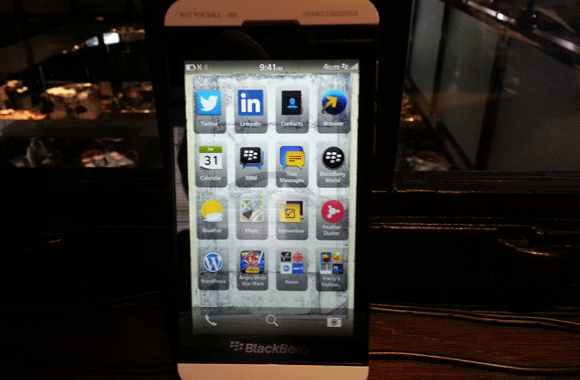Blackberry Aim For Microsoft – They Should Go After Apple

By Mike Wheeler
By Mike Wheeler
After spending the best part of three years developing its new platform, Research in Motion (or Blackberry as it is now being rebranded) has launched its two latest smartphones – touchscreen Z10 and the more traditional Blackberry with a qwerty keyboard, the Q10. Now it is set to take on Microsoft for third place in the Australian smartphone market (behind Samsung and Apple respectively), but maybe it should be aiming higher.
Having bled a fair amount of market share over the past 2-3 years, some would argue that this is Blackberry’s final throw of the dice – and going by the hands on experience at the launch – it’s not a bad roll.
Being a cynic, one has to ask whether the company is hedging its bets by meeting the needs of its current users (with the Q10) while also trying to hitch its wagon to the popular touchscreen mobile devices (with the Z10) that have arrived in the time it’s taken the company to develop the new operating system. Nothing could be further from the truth, says Australian Senior Product Manager Gavin Cross.
“We announced both devices…in New York and obviously the touchscreen marketshare has been growing globally for quite a while, so…it’s natural for us to launch with a touch device,” he says. “We need to make sure that our customers know they are both coming so they can make an informed choice. People that love a physical keyboard and aren’t willing to go to a touch screen are still holding onto their devices today.”
The company acknowledges that it has needed to change with the times (“you can’t not talk to people for two-and-a-half years and not expect to lose marketshare” one exec explained), but has it succeeded?
At the heart of the device is the Blackberry Hub, which has a few cool and interesting features. For a start there is no home button, so you don’t have to keep going back to the smartphones homepage to hit an app – you use the outlying bezel of the phone to scroll through to features and apps. It allows aggregation of social media (nothing new there when compared to rivals), but also allows you direct access to your texts without having to go through the rigmarole of launching an external application.
However, a couple of standout features are it predictive text whereby you swype whole words into your message (as opposed to letters). The more you use your device the quicker this becomes because your device gets to know you; it starts to learn what words you use most often, so the chance of there being a mistake lessens.
Also, there’s Blackberry Balance, which splits your device in two to handle both your professional and private lives. You can maintain security on the work side of the phone, while still employing the device for personal use. There is a virtual firewall in place that stops business data being swapped with personal, and you can even set the phone so that you receive no business info between finishing work on Friday and starting back on Monday.
Overall the device should make the bigger players stand up and take notice, but has Blackberry left its run too late? Maybe not. They are going into Full Marketing Blitz mode over the next few months.
“We’re …coming to market with the largest ever launch campaign,” says Cross. “We’ve covered all bases from print media to TV, to online. There will be very few people – unless they don’t have any technology – who won’t know about Blackberry 10.”
And what about apps? Both Samsung and Apple have huge app stores. Blackberry is behind the eight ball in that department, but Cross is also bullish about this, too.
“We’ve been working on applications with developers since Blackberry World last year (2012) back in May where we announced the new developer platform, and announced Beta devices A and B devices to give to partners to develop [apps for our devices],” he says. “We will have 70,000 apps upon launch. There is an evaluation and approval process. And we have incentives in place that every application that a developer ports to our platform gets some credit, or a device, or we guarantee certain revenue.”
And where does it see itself in 12 months’ time? “Thorsten [Heins – President and CEO of BlackBerry] has stated that the target is Microsoft,” says Cross. “He’s essentially saying that’s the target within the next 12 months. To be a larger platform than Microsoft in the mobile space. Beyond that we keep moving forward.”
Having had a good play with the device, it is surprising they are not going after Apple, whose iPhone 5 has been causing a few concerns. It was recently announced that factories in China were not ordering as many parts of the device, which led to the share price in the company dropping.
Blackberry appears to not only have caught up with its rivals, it is possible, in some aspects, that it may have surpassed them. The next 12 months in the smartphone market will tell analysts whether Blackberry’s long delay at getting back in the game was a well-managed corporate decision, or the death knell of the one of the pioneers in mobile phones.





